PHP is a widely used scripting language, especially for building content management systems (CMS), almost everywhere. Although PHP developers can use many techniques to improve the security of CMS systems, many developers ignore the importance of PHP application security.
Get a preliminary understanding of the concept of PHP application security. PHP application security means paying attention to code vulnerabilities, ensuring that your CMS can prevent various attack types and protect the integrity of website content. Continuously conduct security assessments and vulnerability scans as well as use a number of technologies, including authentication, encryption, firewalls and other security measures.
Next, let’s talk about how to apply security in your CMS using PHP.
- Validation technology
When users submit sensitive or critical information, the use of validation technology can ensure that the entered data is valid. Input validation should be set up to ensure that the data is of the expected type and format. For example, if you require the user to enter an email address, you should use a filter function to verify that the input matches the format of an email address. When using user input data to generate CMS pages, be especially wary of reflected cross-site scripting attacks (XSS), which are accomplished by embedding user-entered script code into these pages. The usual purpose of an XSS attack is to maliciously obtain a user's cookies and thus take control of their account. When avoiding XSS, functions such as htmlspecialchars() should be used to tokenize the input data, so all embedded tags are escaped and not interpreted as HTML tags.
- Encryption technology
Encryption is the core of PHP application security technology. It ensures data protection by converting sensitive information into a format that is not easily identifiable. PHP provides many encryption functions, such as bcrypt and openssl, which can be used to encrypt passwords and other sensitive information. For passwords, salt technology should be used. A salt is a string of characters added before a clear text password to increase the security of the password and make it more difficult to compare the password with a hash of the same password. When using encryption technology, be sure to store encryption keys on the server to ensure sensitive information is properly encrypted.
- Firewall
A firewall is a network security tool that prevents unauthorized network access. Firewalls protect CMS systems from unauthorized access. The firewall in PHP not only protects the system, but can also be used to filter all input requests to prevent malicious data from entering the CMS system.
- Other security measures
In addition to the above techniques, other security measures should be used to enhance the security of the CMS system. For example, secure database queries should be used to avoid SQL injection attacks, HTTP headers should be used to increase cross-site request forgery (CSRF) security, SSL/TLS should be used to ensure communication confidentiality, and so on.
In short, for any CMS system, whether it is a small business website or a large portal, security measures should be used to ensure its security. Security is an extremely important factor when using PHP. For developers developing CMS systems using PHP, fully understand these security measures and apply them to your CMS to protect your system and maintain content. of integrity.
The above is the detailed content of Make your CMS better: Use PHP for security. For more information, please follow other related articles on the PHP Chinese website!
 帝国cms管理员在哪个表Feb 22, 2023 pm 07:00 PM
帝国cms管理员在哪个表Feb 22, 2023 pm 07:00 PM管理员表有:1、phome_enewsuser,是管理员记录表;2、phome_enewsdolog,是管理员操作记录表;3、phome_enewsgroup,是管理员用户组数据记录表;4、phome_enewslog,是管理员登陆日志;5、phome_enewsloginfail,是管理员登陆失败记录表;6、phome_enewserrorclass,是管理员错误报告记录表。
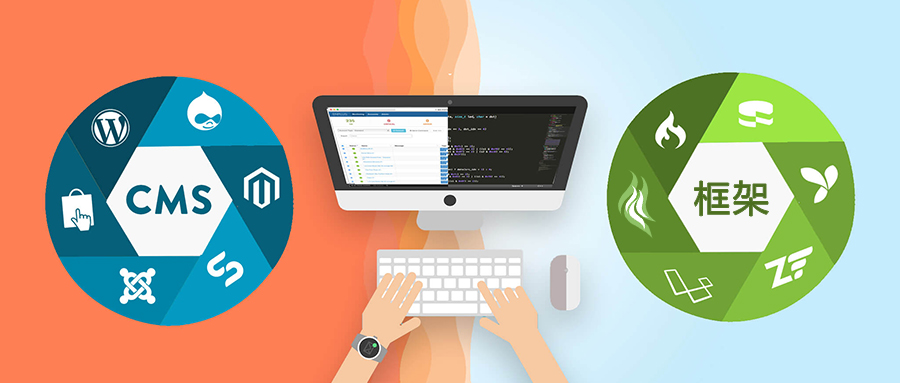 什么是PHP框架?PHP框架与CMS的区别Jun 13, 2022 pm 02:21 PM
什么是PHP框架?PHP框架与CMS的区别Jun 13, 2022 pm 02:21 PM在编程中,框架扩展了构建通用软件应用程序的支撑结构。在你开始编码之前,框架就会将程序的基本功能插入到你的应用程序中,从而简化了软件的开发过程。
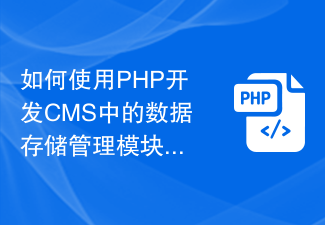 如何使用PHP开发CMS中的数据存储管理模块Jun 21, 2023 am 09:01 AM
如何使用PHP开发CMS中的数据存储管理模块Jun 21, 2023 am 09:01 AM随着互联网技术的不断发展,内容管理系统(CMS)越来越受到广泛关注,尤其是对于企业和机构等需要频繁更新和发布内容的组织。在CMS中,数据存储管理是一个重要的模块,它负责管理系统中的数据,包括创建、更新、删除和查询数据等操作。而PHP作为一种开发CMS的常用语言,本文将介绍如何使用PHP来实现CMS中的数据存储管理模块。1.选择适合的数据库在开发CMS的数据存
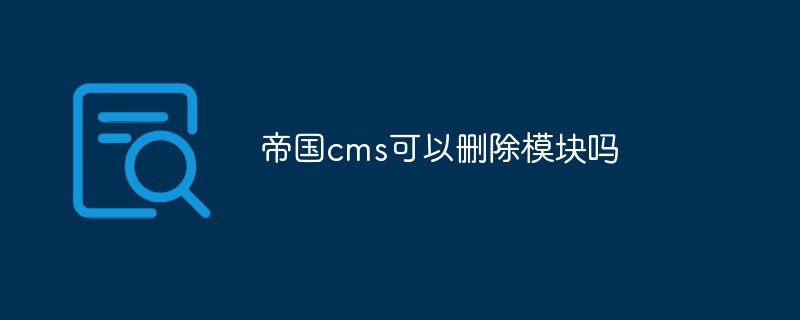 帝国cms可以删除模块吗Mar 13, 2023 pm 07:18 PM
帝国cms可以删除模块吗Mar 13, 2023 pm 07:18 PM帝国cms可以删除模块。删除模块的方法:1、登录帝国CMS后台,依次点击“系统”-“系统设置”-“系统参数设置”-“关闭相关功能”,根据自己网站的需求,自行勾选设置来关闭对应的模块功能;2、关闭功能后,删除对应模块的在e目录下的子目录;3、修改e目录下的php文件,在文件第二行加上代码“exit();<?php exit()”,并保存修改即可。
 织梦cms是什么语言写的Feb 21, 2023 am 09:45 AM
织梦cms是什么语言写的Feb 21, 2023 am 09:45 AM织梦cms是用PHP语言写的。织梦CMS(DedeCMS)是一个PHP开源网站管理系统,作用是构建中小型网站;它采用PHP+MySQL技术开发,可同时使用于windows、linux、unix平台。
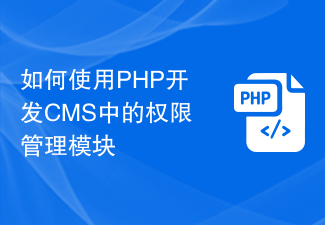 如何使用PHP开发CMS中的权限管理模块Jun 21, 2023 am 08:43 AM
如何使用PHP开发CMS中的权限管理模块Jun 21, 2023 am 08:43 AM随着互联网的普及和发展,更多的网站和应用程序需要实现权限管理模块,以保护自身的安全和保密性。而作为一种流行的后端编程语言,PHP也广泛应用于各种CMS(ContentManagementSystem)中,如WordPress、Joomla、Drupal等。因此,在本文中我们将探讨如何使用PHP开发CMS中的权限管理模块。一、CMS中的权限管理模块在CMS
 帝国cms封面模板是什么意思Feb 13, 2023 am 10:39 AM
帝国cms封面模板是什么意思Feb 13, 2023 am 10:39 AM在帝国cms中,封面模板是指网站频道页面使用的模板,可以制作跟首页一模一样的封面页面;封面模板共使用在两个地方:非终极栏目和专题。封面模板的使用,一般是该栏目为父级栏目(非终级栏目),封面模板的目的就是调用各个子栏目(终级栏目)文章。
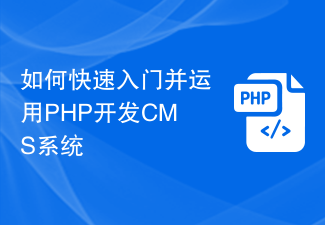 如何快速入门并运用PHP开发CMS系统Jun 21, 2023 am 09:36 AM
如何快速入门并运用PHP开发CMS系统Jun 21, 2023 am 09:36 AM随着互联网的发展,CMS(内容管理系统)系统成为了很多网站的必备工具,而PHP作为目前最流行的网站开发语言之一,也成为了大多数CMS系统的开发语言。如果你想快速入门并运用PHP开发CMS系统,以下是一些指导:第一步:学习PHP基础知识在学习如何使用PHP开发CMS系统之前,你需要掌握PHP的基础知识,包括如何创建基本的PHP文件、如何使用变量和数据类型、如何


Hot AI Tools

Undresser.AI Undress
AI-powered app for creating realistic nude photos

AI Clothes Remover
Online AI tool for removing clothes from photos.

Undress AI Tool
Undress images for free

Clothoff.io
AI clothes remover

AI Hentai Generator
Generate AI Hentai for free.

Hot Article

Hot Tools

SublimeText3 Chinese version
Chinese version, very easy to use

Dreamweaver Mac version
Visual web development tools

WebStorm Mac version
Useful JavaScript development tools

Notepad++7.3.1
Easy-to-use and free code editor

SecLists
SecLists is the ultimate security tester's companion. It is a collection of various types of lists that are frequently used during security assessments, all in one place. SecLists helps make security testing more efficient and productive by conveniently providing all the lists a security tester might need. List types include usernames, passwords, URLs, fuzzing payloads, sensitive data patterns, web shells, and more. The tester can simply pull this repository onto a new test machine and he will have access to every type of list he needs.






